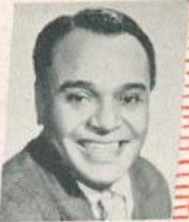Lucky Millinder facts for kids
Quick facts for kids
Lucky Millinder
|
|
|---|---|
 |
|
| Background information | |
| Birth name | Lucius Venables |
| Also known as | Lucius Venable Millinder |
| Born | August 8, 1910 Anniston, Alabama, U.S. |
| Died | September 28, 1966 (aged 56) Harlem, New York |
| Genres | R&B, jump blues, swing |
| Occupation(s) | Musician, bandleader |
| Years active | 1925–1955 |
| Labels | Decca, King |
| Associated acts | Red Allen, Wynonie Harris, Bull Moose Jackson, Sister Rosetta Tharpe, Annisteen Allen |
Lucius Venable "Lucky" Millinder (born August 8, 1910 – died September 28, 1966) was an American bandleader. He led popular swing and R&B bands. What made him special was that he couldn't read or write music. He also didn't play an instrument and rarely sang.
Despite this, his great showmanship and excellent musical taste made his bands very successful. Many people said his group was the best big band to play rhythm and blues. He also helped many musicians who later became famous in the early days of rock and roll. In 1986, he was honored by being added to the Alabama Jazz Hall of Fame.
Contents
Lucky Millinder's Early Life and Career
Lucky Millinder was born Lucius Venables in Anniston, Alabama, United States. He grew up in Chicago and took the last name Millinder when he was a child. In the 1920s, he worked in clubs, dance halls, and theaters. He was a master of ceremonies, which means he hosted shows, and he was also a dancer.
He first led a band in 1931 for a theater tour. In 1932, he became the leader of Doc Crawford's orchestra in Harlem, New York. He also worked as a freelance musician in other places.
In 1933, Lucky took a band to Europe. They played for audiences in fancy places like Monte Carlo and Paris. When he came back to New York in 1934, he took over the famous Mills Blue Rhythm Band. This band had amazing musicians like Henry "Red" Allen and Charlie Shavers. They often played at the famous Cotton Club in New York City.
Leading His Own Orchestra
In 1938, Lucky Millinder joined forces with pianist Bill Doggett. By 1940, Lucky had created his very own new orchestra. This band included Bill Doggett and the drummer "Panama" Francis. Around this time, he discovered the talented gospel singer and guitarist Sister Rosetta Tharpe. His bands performed with her for many years. They first recorded together in 1938 for Decca Records.
Lucky's band became very popular and had a regular spot at New York's Savoy Ballroom. He also signed a contract with Decca Records. The famous jazz trumpeter Dizzy Gillespie played in Lucky's band for a while. Dizzy was featured on Lucky's first big hit song, "When the Lights Go On Again (All Over the World)". This song reached number 1 on the US Billboard R&B chart in 1942. It also made it to number 14 on the pop music chart.
His next songs, "Apollo Jump" and "Sweet Slumber," were also very popular. Trevor Bacon sang the vocals on these hits.
The Shift to Rhythm and Blues
By the mid-1940s, Lucky's band started playing music that sounded more like rhythm and blues. Other great musicians in his band during this time included saxophonists Bull Moose Jackson and Tab Smith. In 1944, Lucky hired the singer Wynonie Harris. Their song "Who Threw the Whiskey in the Well" became the band's biggest hit in 1945. It stayed at number 1 on the R&B chart for eight weeks! It also reached number 7 on the US pop chart.
After Wynonie Harris left to start his own solo career, Lucky had another hit song called "Shorty's Got to Go." Lucky himself sang the lead vocals on this track. Soon after, the famous singer Ruth Brown sang with the band for a short time before she became a solo star.
Towards the end of World War II, it became harder for big bands like Lucky's to tour. This was because of things like gas rationing and new taxes. Smaller bands, like Louis Jordan's, became more popular. In the late 1940s, Lucky's band still toured big R&B venues. However, they didn't have many chart hits for a few years.
In 1949, the band left Decca Records and joined RCA Victor and then King Records. They recorded with singers like Big John Greer and Annisteen Allen. The band's last big hit was "I'm Waiting Just for You" with Annisteen Allen in 1951. This song reached number 2 on the R&B chart and number 19 on the pop chart. A year before, Lucky's song "Silent George" also became a popular song with a playful, slightly cheeky theme.
Later Years and Retirement
By 1952, Lucky Millinder started working as a radio DJ. He continued to tour with his band, but his style of music was becoming less popular. Also, the band had many different musicians over the years, which started to change its sound. In 1954, he led the house band at the famous Apollo Theater for a while.
He mostly stopped performing around 1955, though his last recordings were in 1960. After his music career, he worked in music publishing. He also did public relations for a company that made whiskey. Lucky Millinder passed away in New York City in September 1966 due to a liver problem.
Selected Music Collections
Here are some collections of Lucky Millinder's music that have been released:
LP Compilations
- Lucky Days 1941–1945 (1980)
- Let It Roll (1982)
CD Compilations
- The Chronological Lucky Millinder & His Orchestra 1941–1942 (1993)
- Apollo Jump (2002), a 2-CD set
- Jukebox Hits 1942–1951 (2005)
See also
 In Spanish: Lucky Millinder para niños
In Spanish: Lucky Millinder para niños
 | John T. Biggers |
 | Thomas Blackshear |
 | Mark Bradford |
 | Beverly Buchanan |

